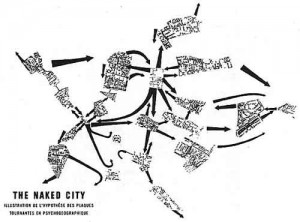So the Dutch created Holland - which made me curious as to what part of…
Walk the walk, don’t talk the talk
 Blogged earlier today about a psycho-geographical tour of Amsterdam, then checked the term as I had not come across it before. So I found it is a Situationist term, closely linked with the ‘derive’ (literally: wandering or drifting), a technique of rapid passage through varied environments.
Blogged earlier today about a psycho-geographical tour of Amsterdam, then checked the term as I had not come across it before. So I found it is a Situationist term, closely linked with the ‘derive’ (literally: wandering or drifting), a technique of rapid passage through varied environments.
Some notes: Psychogeography was defined in 1955 by Guy Debord as “the study of the precise laws and specific effects of the geographical environment, consciously organized or not, on the emotions and behavior of individuals. (Wiki). Another definition is “a whole toy box full of playful, inventive strategies for exploring cities… just about anything that takes pedestrians off their predictable paths and jolts them into a new awareness of the urban landscape.” (Joseph Hart, “A New Way of Walking”).
Psychogeography describes the sudden change in atmosphere a few metres further along a street, and the different characteristics of city districts. It reveals the path of least resistance a person subconsciously takes when wandering aimlessly and points out the attraction or repulsion of particular places. Involving playful-constructive behaviour, dérive examines psychogeographical effects and is thus quite different from the classic notions of journey and routing. Dérives weren’t random; they challenged the psychogeographer to use his powers of imagination to experience the urban environment anew – for example, by following scents or negotiating a route through Paris armed with a map of London.
What propelled these strollers was not so much curiosity but political and theoretical motivations.
The curiosity to discover all aspects of the city developed within Urban Exploration, a network that reports on urban voyages of discovery all over the world on the internet. Its success lies mainly in its illegal and spectacular character. In a response to sensation seeking, those within the Dutch organisation Socialfiction.org, headed by Wilfried Hou je bek (literally: Wilfried Keep-your-bloody-mouth-shut), developed Generative Psychogeography. This focuses on strolling around the city according to a generative algorithm (i.e. one that evolves over time) with the aim of (re)discovering the environment. Three experiments were conducted in the summer of 2001. The directions given to participants were variations on the formula: second right, second right, first left, and repeat.
Without knowing the term, I have already instituted my own generative psychogeographic algorithm. I don’t use an algorithm really, I use a child. As a family, our walk starts at the front door. The first participant chooses left or right. At the next opportunity to choose a way, the next participant decides. And so on, and so on. I can guarantee that when you walk this ‘you-don’t know-where-you-want-to-go-walk’, you will discover things about your immediate neighbourhood you have never known existed! Last time we did this walk was in the City of London: great fun & lots of unexpected places. Our family’s motto: ‘walk the walk, don’t talk the talk’.
| « Seeds of community sown by Aldo van Eyck | <-- previous post | next post --> | Documenting » |
|---|







